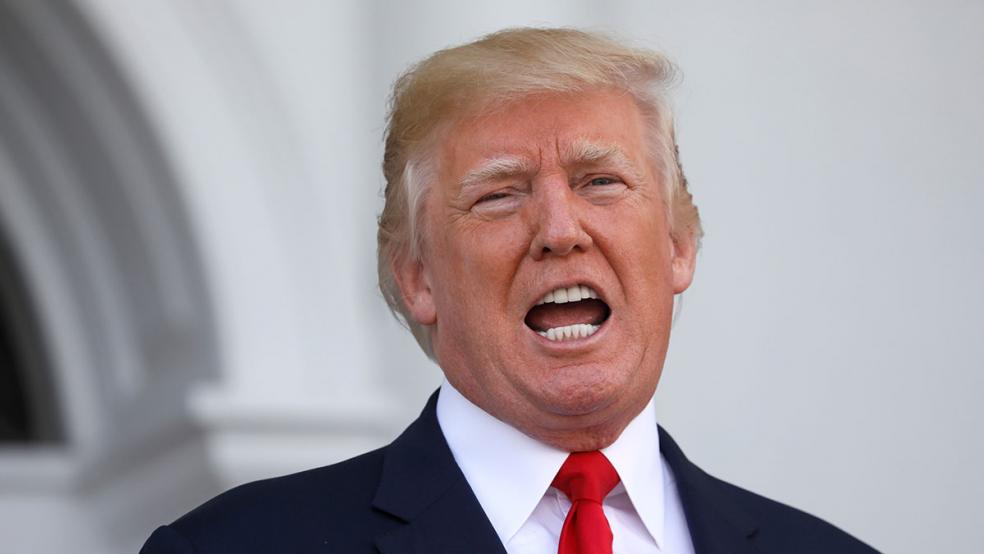In the past 72 hours, President Trump has threatened North Korea with a nuclear attack, suggested that threat may not have been “tough enough” and then, on Friday morning, boasted that the U.S. military is “locked and loaded” in preparation for an attack on the Kim Jong-un regime in Pyongyang.
At no time in recent history has an American president been so free with threats of nuclear war. The flurry of bellicosity has, even more than usual over the first six months of Donald Trump’s presidency, led to critics of the president loudly questioning his sanity.
Related: Why the Escalating Threats Between Trump and Kim Won’t End in War
That may be exactly what Trump wants.
In 1969, another American president in his first term in the Oval Office faced an intractable problem in Asia -- one that he had repeatedly promised to solve while on the campaign trail just a few months before. Having made no progress by his first summer in the White House, he decided to dramatically raise the stakes.
The president was Richard Nixon, and the problem frustrating him was the war in Vietnam. In the summer after taking office, despite the serious reservations of U.S. military leaders, he ordered the armed forces to high alert and sent nuclear-armed bombers to skirt the eastern border of the Soviet Union on three consecutive says.
Nixon was attempting a complex foreign policy bank shot that he hoped would lead to an end of the war in Vietnam. The idea was not to actually attack anybody, but to convince Russia that Nixon was unstable enough that he would risk a “first use” of nuclear weapons to finally decide the conflict, potentially plunging the world into nuclear war in the process. If it succeeded, Nixon hoped, Russia would pressure the North Vietnamese to come to the bargaining table and end the war.
Related: Trump Takes on a Powerful Leader, but This Time It’s on Capitol Hill
Nixon’s former chief of staff H.R. “Bob” Haldeman wrote in his book The Ends of Power that Nixon had explicitly outlined a version of the strategy the previous summer:
“I call it the madman theory, Bob. I want the North Vietnamese to believe that I've reached the point that I might do anything to stop the war. We'll just slip the word to them that, ‘for God's sake, you know Nixon is obsessed about communism. We can't restrain him when he is angry — and he has his hand on the nuclear button’ — and Ho Chi Minh himself will be in Paris in two days begging for peace.”
Nixon would later deny ever using the phrase “madman theory” and, in the end, the ploy didn’t work particularly well, as the war dragged on until 1975. But the phrase became a common shorthand for a particular strategy observed in the larger academic literature of game theory -- the study of strategic decision-making in situations of human competition.
“It’s an argument that there’s a kind of method in the madness -- that there’s a rationality to appearing to be mad to force another player to back down in a confrontational situation,” said Steven Brams, a professor in the Department of Politics at New York University who has studied game theory and international relations.
The idea, he said, is to convince your opponent that either intentionally or by accident, you might do something disastrous for both parties -- like starting a nuclear war -- even if doing so is ultimately against your own interests.
Related: Here’s Why North Korea Put Guam in Its Crosshairs
If successful, the strategy shifts the ultimate goal of the opponent from winning the competition to placating the crazy person sitting across the table.
Trump’s experience in the world of business, Brams said, has almost certainly made him personally familiar with the strategy.
“It’s a common argument in bargaining situations, which of course is Trump’s background,” he said.
In fact, he pointed out, Trump’s history of driving several large business ventures into bankruptcy with questionable decision-making likely only increased the effectiveness of a “madman strategy” in the corporate world.
Adding to the evidence that Trump is consciously pursuing a strategy of appearing erratic and impulsive, he has said countless time in interviews before and after being elected president that he values appearing “unpredictable” in negotiations.
Related: Here's How North Korea's Military Stacks Up Against the US
“Unfortunately, I don’t think it translates well in this particular case,” Brams said. “I think in business dealings, Trump could threaten to do something dire, but dire wasn’t blowing up the world. It maybe blew up some business enterprise -- preferably not his -- but he could claim that both sides would go down and he was more willing to accept that than the other side. But now, when you are talking about nuclear weapons, it seems to me it’s a much more dangerous game.”
Even more troubling, he said, is that Kim, the young North Korean despot with a finger on his own nuclear button, appears to be pursuing a similar strategy.
“We’re in a situation where the opponent is playing the same sort of game,” he said. “It’s worrisome that they both could escalate to the point of no return.”
And as if that possibility isn’t upsetting enough for you, Brams has one more observation: The whole concept of madman theory rests on the idea that the person executing the strategy isn’t actually insane.
“The main point is that it’s feigned,” he said. “You’re not really as crazy as you seem, but you want the enemy to think you are. Now, I think in Trump’s case, he may be as crazy as he seems.”





